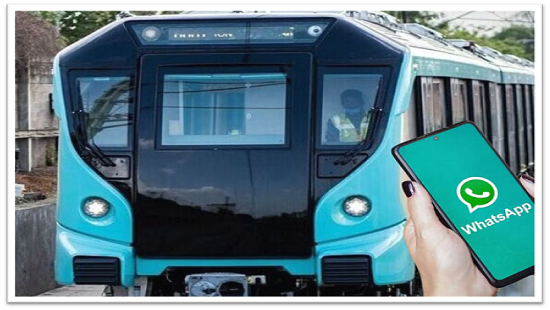
Mumbai Metro Line-3 Added WhatsApp Ticketing, Transforms Urban Travel in Mumbai
In a move that reflects India’s accelerating digital journey, the Mumbai Metro Rail Corporation has introduced WhatsApp-based ticketing for the newly inaugurated Mumbai Metro Line-3, also known as the Aqua Line. The feature allows commuters to book metro tickets directly through WhatsApp, marking a step toward faster, paper-free, and more convenient travel for millions of Mumbaikars.
This initiative, launched soon after Prime Minister Narendra Modi inaugurated the underground Aqua Line, represents a growing trend of technology-driven governance in India’s urban transport systems. Supported by Meta and implemented by PeLocal Fintech Private Limited, the system aims to make commuting simpler, reduce queues, and promote sustainable, digital-first travel in the country’s financial capital.
The Vision Behind Mumbai Metro Line-3
Mumbai Metro Line-3, also known as the Aqua Line, connects Cuffe Parade in South Mumbai to Aarey JVLR in the northwestern suburbs. Stretching over 33.5 kilometers with 27 underground stations, it is the city’s first fully underground metro corridor. When fully operational, it is expected to serve more than 17 lakh passengers every day, cutting travel time by up to 45 percent for several key north-south routes.
The WhatsApp ticketing feature is not just about convenience. It is part of a larger effort to make urban mobility seamless, efficient, and inclusive in one of the world’s most crowded metropolitan regions.
How WhatsApp Ticketing Works
The booking process is designed to be quick, easy, and accessible for all users. Travelers need to send “Hi” to the WhatsApp number 91 98730 16836, scan the QR code displayed at metro stations, and receive their QR-based digital ticket in the chat window.
Commuters can generate up to six QR tickets in one transaction, making it suitable for groups and families. Payments can be made through UPI or cards, ensuring flexibility while supporting India’s Digital India mission. By replacing paper tickets, this move also helps reduce waste and operating costs while encouraging eco-friendly travel habits.
A Step Toward Seamless and Sustainable Transit
MMRC Managing Director Ashwini Bhide said that the WhatsApp ticketing service is part of the organization’s commitment to offering smooth, efficient, and sustainable travel experiences. Her statement reflects a broader vision of improving urban mobility while promoting environmental responsibility.
With more than 50 lakh tickets expected to be sold digitally each month across different metro lines, paperless ticketing could save hundreds of tons of paper every year. The reduction in contact-based transactions also adds a layer of safety and hygiene, an important factor in post-pandemic commuting patterns.
Building on Earlier Success
WhatsApp ticketing is already in use on Mumbai Metro Lines 2A and 7, managed by the Maha Mumbai Metro Operations Corporation Limited. The success of these earlier rollouts, which led to a 40 percent reduction in queue times and improved commuter satisfaction, encouraged its expansion to the Aqua Line.
This digital integration not only saves time but also improves the overall commuter experience. The success of Line-3 may set a strong precedent for other Indian cities looking to adopt similar digital systems.
Mumbai One App and Unified Travel Experience
The launch of WhatsApp ticketing has coincided with the introduction of the Mumbai One app by Prime Minister Narendra Modi. The app brings together 11 different public transport systems across the Mumbai Metropolitan Region under one digital umbrella.
Through Mumbai One, commuters can plan, book, and pay for their entire journey using a single interface, covering metro lines, local trains, buses, ferries, and parking facilities. Together, the Mumbai One app and WhatsApp ticketing represent a step toward an integrated mobility ecosystem, allowing residents to travel across the city more efficiently.
Technology and Governance Hand in Hand
India’s cities have often struggled to keep infrastructure growth in step with population needs. However, innovations like WhatsApp ticketing show a new approach to urban development—where technology, governance, and citizen participation work together.
By using a familiar and widely adopted platform like WhatsApp, the Mumbai Metro eliminates the need for a separate application, ensuring inclusivity for first-time digital users as well. This reflects a shift toward smart governance that values simplicity, accessibility, and transparency.
The Road Ahead
As Mumbai Metro Line-3 expands its operations, digital tools will continue to shape commuter habits. With rising smartphone usage and growing trust in digital payments, the future of urban travel is expected to rely more on QR-based and app-driven ticketing.
Cities like Delhi, Bengaluru, Pune, and Hyderabad may soon follow Mumbai’s example by introducing similar systems that combine convenience with sustainability. This evolution represents not just smart transportation but also the emergence of smarter cities.
The launch of WhatsApp ticketing for Mumbai Metro Line-3 is more than a technological innovation. It represents a new level of confidence in how India designs, manages, and experiences urban mobility.
By turning an everyday chat platform into a tool for public transport, the Mumbai Metro has brought together efficiency, accessibility, and sustainability in one system. It demonstrates how thoughtful digital solutions can make a city’s daily rhythm smoother and its future brighter—one QR ticket at a time.




